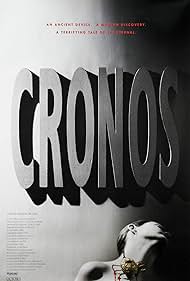A mysterious device meant to give its owner eternal life resurfaces after 400 years, leaving a trail of devastation in its wake. In an interview included in the Criterion edition of this film, Ron Perlman talks about how Angel was supposed to be fluent in Spanish. Ron Perlman attempted to do this, but Guillermo del Toro found his reading skills to be completely useless, so the character was changed to an expatriate American who hates being in Mexico so much that he deliberately speaks the little Spanish he knows poorly. When Jesús looks for Aurora after she takes the Cronos, he stops as he passes through two doors. Behind him, reflected in the glass of the door, are the crew and equipment. [discusses why Deiter wants the Cronos] Jesus Gris: He thinks it will help him live longer. Angel de la Guardia: [laughs] This wanker does nothing but shit and piss all day and he wants to live longer? Some explicit nude scenes were added in the US video release. While the primary American theatrical version includes a prologue and portions of dialogue in English, a secondary market version will be entirely in Spanish. As seen in Masters of Horror (2002). Die Schöne Müllerin, Franz Schubert, Arreglov: Charlotte Georg (as Lee Ashley), BMI, Publisher: Software Music BMICortesia de Capitol Productions, Music – Ole Georg. Severely underrated on this website, “Cronos” is a gripping narrative that keeps the viewer hooked for its entire duration. Guillermo Del Toro’s very first film is a thoughtful, heartbreaking story that manages to be fresh, intriguing and unique above all else, while also capturing the feel of horror films in the style of “The Shining”, being a film about family first and a horror film second. Cronos certainly won’t be associated with the slasher end of the horror market, nor does it come anywhere close to the filthy sensory assault of goreography. Cronos manages to assault the mind and soul, which is exactly what a horror film needs to do if it wants to leave a lasting impression. With that in mind, I can understand to some extent where the mediocre rating comes from. It’s not a bloodbath, it’s not a scare for a second, and there are no unnecessary scenes of eye-gouging with rusty pickaxes. But as any true horror fan knows, these are just side attractions to the better horror films like The Shining or The Fog, and Cronos, while not quite at the top, is very close. There are three things that stand out about this film and make it undeniably worth watching. The most subtle is the commentary on US-Mexico relations that Guillermo Del Toro weaves throughout his film. He offers an interesting portrayal of how he, and no doubt many Mexicans, feel about their encounters with the US, that they always seek to be dominated and must assert themselves to succeed. Most obvious are the notable Christian references and deliberate wordplay. Our protagonist, the antiques dealer, is named Jesus, simply for the sake of rebirth, but there are many “my God,” “my Lord,” and more comments of this nature in the film, there is undoubtedly a subplot by the director pointing out the good that still emanates from our protagonist. Jesus’ granddaughter and wife are named Aurora and Mercedes respectively, and knowing the meaning of their names, namely “the dawn or first light” and “grace,” gives the film’s finale a sense of completion. Finally, we must highlight the acting of Federico Lupi and Tamara Shanath, who, even in movement, if not through song, bring the dignity necessary to convey the deep emotional bond between grandfather and granddaughter which, if you leave everything else aside, is the driving force of this story and which leaves you wanting more.



 20/49
20/49